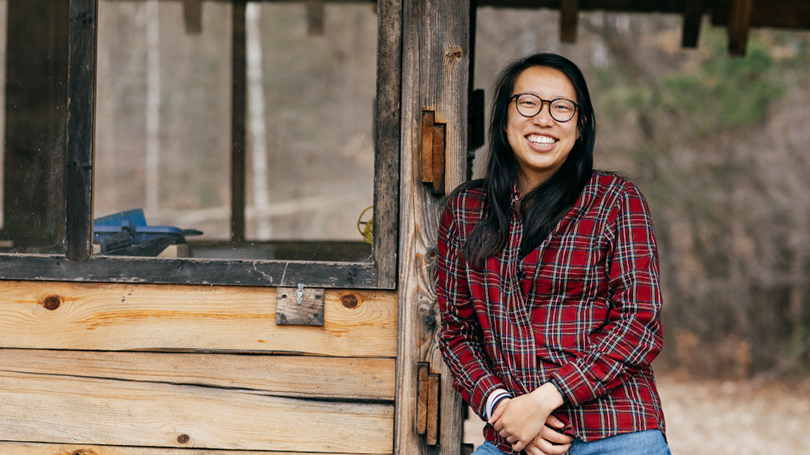
Michelle Wang ’21. Photo by Robert Gill, Dartmouth College.
- About
- Education
- Research
- Engagement & Collaboration
- News & Events
Back to Top Nav
Back to Top Nav
Back to Top Nav
Back to Top Nav
Michelle Wang '21
Hometown: Claremont, CA
Major: Engineering Sciences, modified with Earth Sciences
Michelle Wang knew that she was going to major in engineering when she came to Dartmouth. And while she wasn't sure exactly what specific form her interest in environmental protection would take, she knew that it, too, would shape her academic career. But energy as a focus came about more serendipitously —by saying yes to what she describes as the many 'wacky opportunities' that have come her way as a Dartmouth student.
For instance: her participation on the international Marine Energy Collegiate Competition (MECC) team. Michelle has worked in the Dartmouth Sustainability Office for her four years at Dartmouth, and has been involved in many aspects of the Sustainability program, from working on the Organic Farm to managing the 20-21 first-year program. Despite her engineering major, she never "got involved on the science side of things" in the office, though. When friend and fellow Sustainability intern Emily Martinez '21 invited Michelle to participate on the MECC team, however, Michelle says she said yes because she was interested in the ocean and it seemed like a great opportunity. The team not only included other Dartmouth students, but also students from Mexico. They went on to win the competition's Moonshot Award for their proposal to build a 60MW ocean thermal plant off the coast of Cozumel. [Read more about the team and the project here.]
And during summer 2020, anxious to find something to do in a pandemic-restricted world, Michelle took a friend up on an offer to intern virtually at Solar Stewards, (an Irving Institute mini-grant helped defray her costs.) While she didn't have any experience in solar, Michelle again said yes, and wound up with a hands-on education in solar finance. Additionally, as part of her internship, Michelle gave a presentation titled "Embracing the Benefits of Both Social and Environmental Justice: A Guide to An Equitable Energy Recovery" at the 2020 National Energy Utility Affordability Coalition conference.
Michelle will continue her work in energy as she completes the Bachelor of Engineering and Masters of Science program at the Thayer School of Engineering next year, working on biofuels as part of an Irving Institute Seed Grant-funded study, "Soil Incubation Experiments to Inform a Strategy for Cellulosic Biofuel Production that Avoids Land Competition and Improves Agricultural Sustainability." (The project principal investigators are Assitant Professor of Biological Sciences Caitlin Hicks Pries and Thayer Professor Lee Lynd.) Despite having not had energy on her radar when she came to Dartmouth, Michelle says, "I've hit three different types of energy so far — solar, marine, and biofuels!"
The transformation of the energy system at Dartmouth was another formative element in Michelle's energy education. Working in the Sustainability Office gave her a front-row seat to learning about the options the College is considering as it transitions away from number 6 fuel oil. "The Dartmouth energy system needs some out-of-the-box ideas," she says, and it has been instructive to learn from all the conversations and research that are going into planning the transition.
The biggest takeaway from her undergraduate experience is staying open to the opportunities Dartmouth offers. "I have yet to find my academic calling, but I've just been saying yes to everything that comes up. That's why I've been involved in the ocean project, solar, biofuels…I hope someone offers me a wind thing! I think that, to me, is what makes Dartmouth so wonderful — the ability to pivot, to do anything at any time. Whether it's being involved with the design of a power plant or doing economic analysis of a big energy project… there are so many opportunities. The thing I've done right is just saying yes, and that's how I stumbled into this energy space. It was in no way intentional … accidental yeses all the way through!" She hopes other students take the same approach.
"Energy is the defining challenge of our time," she says, "so it's important that we all stumble in!"